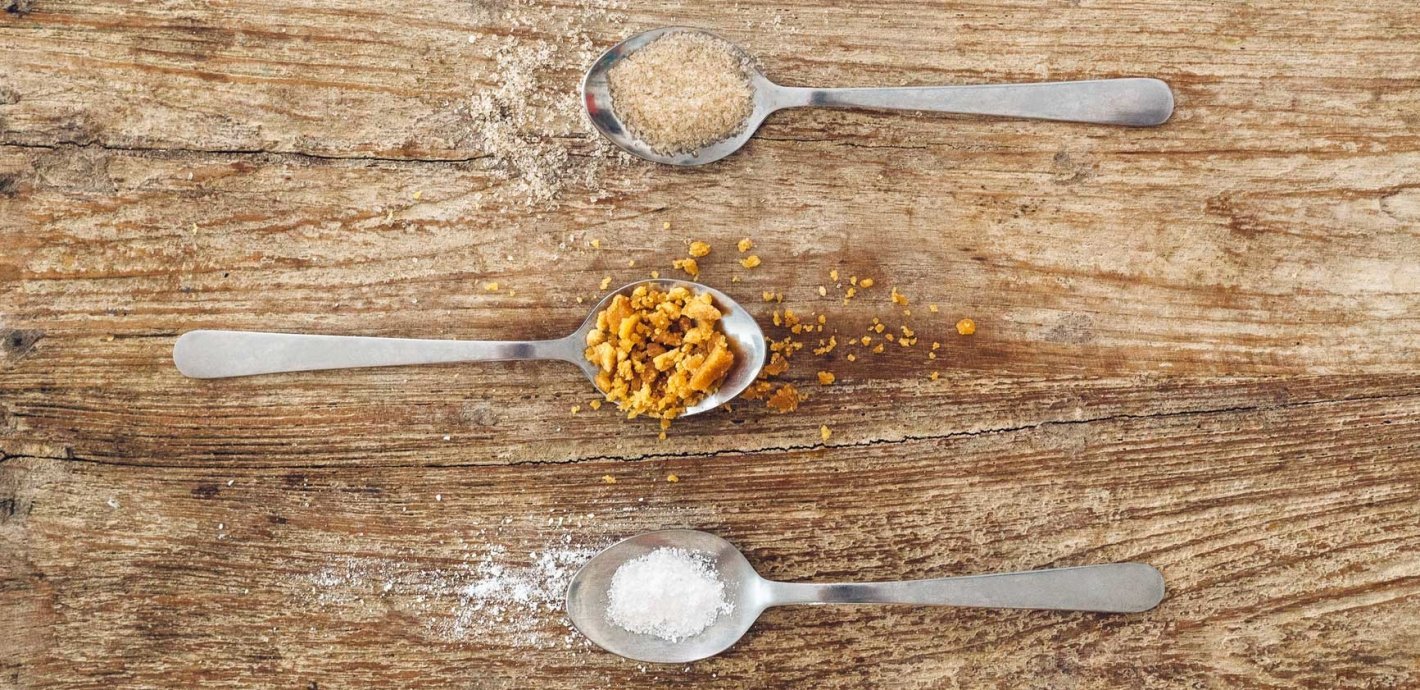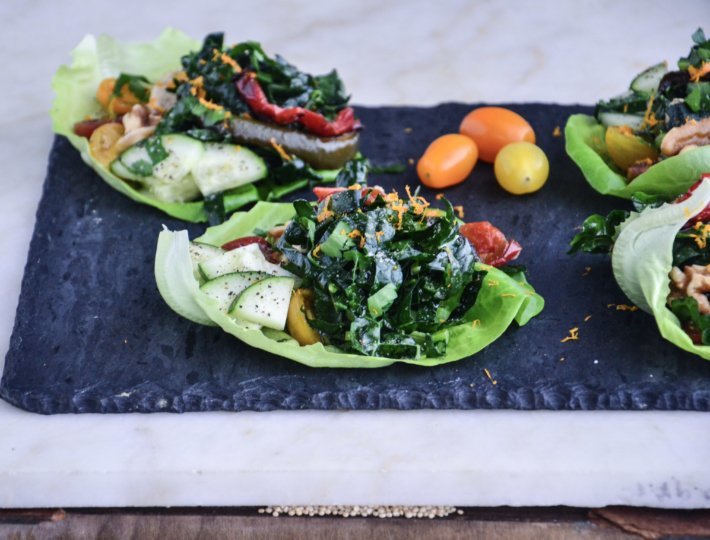Perplexed about whether to choose pink, blue, yellow, or perhaps white? In case you were wondering, I’m not referring to your new spring wardrobe…I’m talking about the packets of sweeteners you may be considering for your coffee.
Many of us search for a taste that could satisfy a sweet tooth without packing on the extra calories that regular sugar brings. Sugar is a master of disguise and can lurk within an ingredient list appearing as corn sweetener, glucose, maltose, organic cane syrup, sucrose, and Turbinado sugar, just to name of few aliases. In light of all the negative attention sugar attracts, there’s a wide range of competing, lower calorie products on supermarket shelves, yet with such variety comes confusion about which sweetener to choose.
Although these “sugar substitutes,” as they are sometimes referred to, can be seamlessly swapped into your diet, it’s important to look at the pros and cons of each to determine which, if any, is best suited to your particular needs. Whether it’s to cut calories, prevent cavities or help control blood sugar levels, artificial sweeteners and sugar substitutes are here to stay. In fact, many of these products are even being blended together to provide smoother tastes.
Zero calorie artificial sweeteners are typically made from sugar alcohols, synthetic sugar substitutes, or can be derived from herbs, plants, or the sugar plant itself. Artificial sweeteners are usually much sweeter tasting than table sugar, some even hundreds of times as sweet. Originally these products were reserved as a sweet option for consumers with diabetes to help control surging blood sugar levels, especially with regards to sugary foods. Sugar substitutes are now commonplace in homes across the globe, appearing in many “sugar-free” or “diet” candies, cookies, and beverages. It’s important, however, to pay careful attention to food labels so that you’re not duped by the word “free.” Items that are free of one thing (like sugar) could be costly to your health if it’s replaced by another ingredient (like fat or sodium) that could be just as unhealthy and similar in calories. And speaking of labeling, several of these artificial sweeteners attempt to captivate attention by boasting of claims of being “natural,” even though this term has never been clearly or officially defined.
In spite of continued controversy as to whether the use of these products poses health risks, consumers remain loyal to their colorful little packets. Here are the contenders:
Aspartame
AKA: Equal, NutraSweet
Color of packet: Blue
Calories: Zero
Pros: Since being approved by the FDA in 1981, studies have found no convincing evidence and the FDA, the World Health Organization, and the American Dietetic Association say aspartame in moderation poses no threats. (The Center for Science in the Public Interest [CSPI] feels differently, and gave it their lowest ranking in a review of food additives.)
Cons: As one of the most studied artificial sweeteners, aspartame has been accused more than any other of causing anywhere from weight gain to cancer. People with phenylketonuria, an inherited genetic disorder, should avoid it altogether. This product is not recommended for baking.
Stevia
AKA: Reb A, Rebiana, Truvia, PureVia, Enliten, and Sun Crystals
Color of Packet: White
Calories: Zero
Pros: Derived from the stevia plant, it has been naturally sourced and consumed by other cultures for years. You can grow this herb in your own backyard. For the same level of sweetness as from cane sugar, stevia requires 80 percent less water and is therefore more sustainable. This plant also requires less land and energy and since it has fewer predators, it requires less in the way of pesticides to protect it than does sugar cane and other sugar-providing plants. You can bake with Stevia.
Cons: More research is needed to completely deem stevia free from risks. Some forms of stevia have a slight fennel taste but this could be abated by using different compounds from the stevia leaf. (Yet there are some some cultures that actually prefer this taste difference.) Stevia is not any more or less effective than any other sugar substitute.
Saccharin
AKA: Sweet’N Low
Color of Packet: Pink
Calories: Zero
Pros: You can bake with Sweet’N Low.
Cons: There has been much controversy surrounding Sweet’N Low and its possible cancer-causing effects. In fact, saccharin used to carry a warning label that linked it to bladder cancer in rats; later studies, however, found this to only be true in rats and the warning was rescinded in 2000. Saccharin has a bitter aftertaste.
Sucralose
AKA: Splenda
Color of Packet: Yellow
Calories: Zero
Pros: Sucralose received FDA approval in 1998, and although one study showed it may negatively impact the immune system, follow-up studies did not find a correlation. You can bake with Splenda.
Cons: Splenda’s safety has been questioned in a recent study published in the International Journal of Occupational and Environmental Health. This report found that male mice fed high doses of sucralose daily throughout their lives developed malignant tumors and hematopoietic neoplasias (leukemia, lymphoma, and other plasma cell disorders). It’s important to note that the very same study showed that there was actually a decrease in cancerous tumors in female mice. What’s key here is the exposure levels, or in other words, how much of the stuff you use and how often you use it. Moreover, as with all scientific studies, you should not form an opinion based upon on one study alone. In response to this study, CSPI then downgraded Splenda from “caution” to “avoid.”
Splenda is synthesized by replacing sucrose’s three glucose molecules with chlorine molecules. The safety of the chlorine in Splenda has been questioned.
Sugar Alcohols
AKA: sorbitol, mannitol, xylitol, maltitol, maltitol syrup, lactitol, erythritol, isomalt and hydrogenated starch hydrolysates.
Calories: Range from zero to 3 calories/gram
Pros: Sugar alcohols aren’t nonnutritive sweeteners—they contain 2.6 calories per gram. Because they are not completely absorbed and metabolized, they provide fewer calories than most sugars. They may not cause tooth decay like table sugar; in fact, gum made with xylitol was actually found to help prevent cavities in children.
Cons: Eating large amounts of sugar alcohols (particularly of mannitol) may cause bloating, diarrhea, and an array of uncomfortable gastrointestinal side effects. The company that manufacturers Swerve sweetener, claims it is less likely than other forms of sugar alcohol like xylitol and maltitol to cause gastrointestinal distress, however sensitive individuals may still experience a reaction.
Most people think of sugar substitutes as being calorie-free, but that is not the case with sugar alcohols. They do contain some carbohydrates, so eating them in excess may increase blood sugar and add more calories than you’d expect from “diet” products.
The Bottom Line
Personally, I’m not a fan of artificial sweeteners or sugar substitutes. If I need a little sweetness in my cappuccino to help me avoid the temptation of ordering dessert, I’ll add a bit of table sugar. If, however, I preferred a sweet taste in my daily cups of coffee or I needed to restrict sugar in my diet for medical reasons, I might rely on an alternate sweeter to keep calories and blood sugar in check. Here are some tips to keep in mind before tearing into that little packet:
1. Artificial sweeteners can tempt your palate. Some studies have shown that regularly consuming artificial sweeteners can elicit cravings for more sweets, instead of creating a sense of satisfaction. Even sweeteners claiming to be “natural” may pose a similar response.
2. You cannot judge a sweetener by its “natural” label. Just to put things in perspective…sugar is natural, but that doesn’t mean it deserves health food status. The term “natural” has yet to be defined by the FDA for any food, so sweeteners that use this label to entice consumers to try their product, have most likely established their own definitions for the word.
3. Artificial sweeteners may thwart weight loss efforts. Many large, well-designed studies have shown that the use of artificial sweeteners is associated with weight gain. Moreover, artificially sweetened cakes, cookies and other desserts could be laden with fat and other ingredients of little or no nutritional value.
4. Some sugar substitutes could use a warning label. Regular and excessive use of sugar alcohols can lead to an upset stomach with laxative-like side effects.
5. More research is needed to prove the carcinogenic effect of artificial sweeteners. The bottom line is that there has not been enough high quality research to prove that these sweeteners pose no health risks, but studies conducted on mice consuming quantities of these foods, far beyond what any human would ever consumer, may need to be put into perspective.
6. Look beyond sensational headlines. As long as there will be sweeteners there will be studies that show their pros and cons. Look beyond sensational stories to see how many subjects were used in studies, and if animals were analyzed, question whether whether the findings can be extrapolated to humans. Be sure to check whether the results actually show a cause and effect relationship or just an association between the variables assessed.









Comments (0)